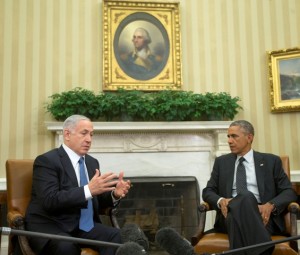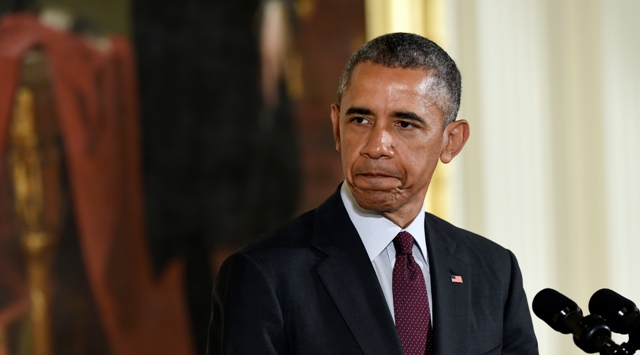In an interview with Israel’s TV Channel 2, Obama said he does not believe Israel is committed to peace and warned that he may not be able to defend Israel at the UN. He glaringly raised no such doubts about a Palestinian commitment to end the conflict.
and AP


PM Benjamin Netanyahu (L) and President Barack Obama. (AP/Pablo Martinez Monsivais)
Prime Minister Benjamin Netanyahu has clearly stated that he supports a two-state solution and seeks a resolution to the Palestinian-Israeli conflict through direct negotiations, but US President Barack Obama is not convinced.
In an interview aired Tuesday evening on Channel 2 TV’s investigative program Uvda (Fact), Obama charged that Netanyahu reinforced the impression that Israel is not committed to peace by saying, during the recent election campaign, that there would be no Palestinian state under his watch.
Netanyahu explained that he is committed to a Palestinian state under specific conditions, largely dealing with security, but Obama alleged in the interview that the initial comments were “fairly unequivocal” and that it was “difficult to simply accept at face value” the Israeli leader’s clarifications, which “appear to look as if this is simply an effort to return to the previous status quo – that we talk about peace in the abstract, but it is always tomorrow.” Furthermore, the conditions set down by Netanyahu make it “not realistic to think that those conditions will be met anytime in the near future.”
“Already, the international community does not believe that Israel is serious about a two-state solution. The statement the prime minister made compounded that belief that there’s not a commitment there,” Obama stated.
Netanyahu had made a last-ditch attempt to rally voters by reversing a previous commitment to a Palestinian state and warning that Arab-Israelis were heading to the polls “in droves,” the American president continued.
Obama also voiced concerns regarding “politics that’s motivated only by fear,” which he said could stand in the way of peace with the Palestinians.
“I think Prime Minister Netanyahu is somebody who’s predisposed to think of security first; to think perhaps that peace is naïve; to see the worst possibilities as opposed to the best possibilities in Arab partners or Palestinian partners. And so I do think that, right now, those politics and those fears are driving the government’s response,” he said. “What might seem wise and prudent in the short term, might end up being unwise over the long term, and it is not simply the fear of immediate terrorism that should concern Israel.”
Obama demanded not only words about peacemaking, but concrete action in that direction. “That is going to be hard work, because right now there is not a lot of confidence in the process,” he said. If “nobody believes there is a peace process,” he may decide to reassess US policy towards Israel with regard to resolutions at the United Nations.
“If, in fact, there’s no prospect of an actual peace process, if nobody believes there’s a peace process, then it becomes more difficult to argue with those who are concerned about settlement construction, those who are concerned about the current situation – it’s more difficult for me to say to them, be patient and wait because we have a process here – because all they need to do is to point to the statements that have been made saying there is no process,” he said.
Netanyahu: Israel Will Defend Itself
PM Benjamin Netanyahu (C), IDF Chief of Staff Gadi Eizenkott (L) and Defense Minister Moshe Ya’alon (R). (Koby Gideon/GPO)
Obama and Netanyahu have had a tense relationship and are divided on the Iranian nuclear issue. Netanyahu is adamantly opposed to the framework agreement between Iran and the six world powers, led by the US, saying it would fail to prevent the Islamic Republic from obtaining a nuclear weapon.
In Tuesday’s interview, Obama appealed to Israelis, saying that only diplomacy, not a military option, can prevent Iran from obtaining nuclear weapons.
After stating several times that “all options are on the table,” including military action against Iran’s nuclear sites, if negotiations with the Islamic Republic fail, Obama has changed his position. “A military solution will not fix it. Even if the United States participates, it would temporarily slow down an Iranian nuclear program, but it will not eliminate it.”
Speaking at IDF Home Command headquarters during a nation-wide emergency drill Tuesday to test Israel’s preparedness for a wide array of crises, Netanyahu asserted: “When it comes to Israel’s security, I rely, first of all, on ourselves.”
Obama did not question whether there is a sincere Palestinian commitment to peace during the interview, nor did he mention, for example, the Palestinian Authority’s incitement to terror.

